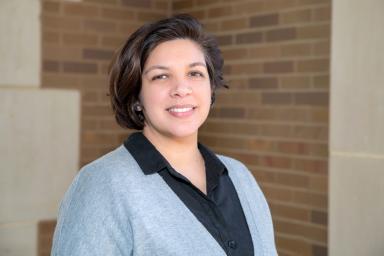Daniela Johannes
Assoc. Prof. Daniela Johannes
West Chester University of Pennsylvania (USA)
Guest researcher in June and July 2021 in the UniGR-CBS at Saarland University
- The UniGR-CBS talked to Daniela Johannes about her research stay
-
I am Dr. Daniela Johannes, Associate Professor of Latinx Studies at West Chester University of Pennsylvania in the U.S.. My host University at UniGR-CBS is Saarland University. I stayed in Saarbrucken during the summer of 2021. My proposed research highlights how contemporary borderlands literature represents a geo-political opportunism of the U.S. state, at the crossroads of state violence, nature agency and human affects, where the Sonoran Desert environment takes center stage as a crucial aspect of border securitization that begins a “nature politics” mode of sovereignty.
What is your background as researcher?
Grounded in the fields of Border Studies and Latinx Studies, as well as Literature and Cultural Studies, and employing a philosophical theoretical framework, my research revolves around the exploration of U.S.-Mexico border issues, specifically what I call “border affect,” the dynamic relationships between individually motivated actions, modes of security and material culture as they take place in the border region of the Sonoran Desert. My writing is theoretically based on philosophical trends of “new materialisms,” interdisciplinary critiques that consider non-human matter as an agency of political significance. Through my research I advocate for the humanization of the conversation on borders through returning the agency to a Latinx people, who have remained at the margins of history.
Why is the UniGR-CBS an interesting partner for your research?
UniGR-CBS is strategic in the field of border studies, covering a geographical area that poses an emergence of a transnational political and critical community within Europe. Border paradigms are determined by regional politics and overlying geopolitical events that seem to contradict those of the U.S., however, the current geopolitical moment as a globally-borderized phenomenon brings about a reimagining of border knowledge, as well as a re-assemblage of resistances beyond geographical and disciplinary boundaries. In this spirit, UniGR is a crucial space to undertake these scholarly dialogues on the field.
What kind of cooperation activities have been implemented during your research stay?During my stay I was able to research and participate in international collaboration around border issues within the UniGR cross-border network members, with especial interest in the multidisciplinary fields of literary and cultural studies and North American studies. I presented two of my works in progress, “Dust and Death: Politics of Nature at the U.S-Mexico Border” and The Calendars of Death: Necropolitics at the Border and the Affective Power of Art” at the ongoing research colloquium organized by Dr. Astrid Fellner and the American Studies Department. I attended public forums off-campus organized by the host Department and met with administrators and faculty at Saarland University, the European Academy and the German-American Institute to expand collaborations.
How will the future cooperation look like?In conversations with Astrid Fellner and Eva Nossem, future common projects include maintaining collaborations between West Chester University and Saarland University for the possibility to launch a faculty exchange program, as well as opening opportunities for students to do short studies abroad. As director of Latin American and Latinx Studies at West Chester, I plan to bring in our collaborations to enrich the program through joint participation in guest speaker events, a panel at our annual Latinx Communities Conference or other kind of public forum. In addition, we have been organizing a second visit to Saarbrucken to expand collaborations within the frame of Eva Nossem´s initiative “Border Languaging,” by introducing West Chester scholar-filmmaker Dr. Iliana Pagán, whose new film Twin Tongues explores the risks and politics of language loss of migrant children in the U.S.
Overall, I project to work with Dr. Fellner and Eva Nossem at Saarland University to benefit both our institutions, as we collaborate to bring together geographical diversity, as well as interdisciplinary potential.

